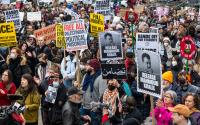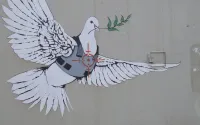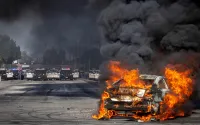19 July 2006
Every network television news program, every cable news station, every newspaper and every news web site has been covering, and will continue to cover, the horrific mayhem unfolding between Israel and Lebanon. Anyone seeking information on that situation will not struggle to find it. In fact, it has become something of a challenge to stay abreast of the continuing carnage in Iraq.
We still have tens of thousands of soldiers there. Nineteen of them have died since the beginning of July, and 2,553 have died since the whole thing started. 150 Iraqi civilians have been killed in the last three days, adding to the 6,000 civilians who have been killed in the last two months, adding to the tens of thousands who have been killed over the last three years.
So.
A few days ago, the UK Times published an article titled "Baghdad Starts to Collapse as Its People Flee a Life of Death." The author, James Hider, offered a glimpse of life within a civil war. "I returned to Baghdad on Monday after a break of several months," wrote Hider, "during which I too was guilty of glazing over every time I read another story of Iraqi violence. But two nights on the telephone, listening to my lost and frightened Iraqi staff facing death at any moment, persuaded me that Baghdad is now verging on total collapse.
"Ali phoned me on Tuesday night, about 10:30 p.m.," continued Hider. "There were cars full of gunmen prowling his mixed neighbourhood, he said. He and his neighbours were frantically exchanging information, trying to identify the gunmen. Were they the Mahdi Army, the Shia militia blamed for drilling holes in their victims' eyes and limbs before executing them by the dozen? Or were they Sunni insurgents hunting down Shias to avenge last Sunday's massacre, when Shia gunmen rampaged through an area called Jihad, pulling people from their cars and homes and shooting them in the streets?"
On the same day as Hider's article was published, Reuters came out with a similar report titled "Guns Galore as Anarchy Stalks Baghdad." The author, Miriam Karouny, describes a society that is arming itself to the teeth to try to avoid the daily massacres in the streets. "In Baghdad," reported Karouny, "it can seem everyone these days is armed, a mark of violence that is ever more anarchic and prompting efforts by the government, U.S. military, and even militia leaders, to curb rogue gunmen, especially among majority Shi'ites, who threaten what the prime minister has called the 'last chance' for peace. Some observers fear that a third, even more intractable, phase of the conflict has been reached, beyond insurgency and beyond even combat between organized armed groups: 'What we're now seeing has no shape whatever,' a Western diplomat said. 'It's just everyone fighting everyone. Anarchy.'"
On Tuesday, an armed gang presumed to be Sunnis attacked mourners at the funeral of a member of the Shiite militia called the Mahdi Army. Nine people were killed in the attack. The gunmen then drove to a marketplace south of Baghdad in the town of Mahmoudiya, killing three soldiers at a checkpoint along the way. At the marketplace, the gunmen attacked a crowd of civilians with automatic weapons, rocket-propelled grenades and mortars. More than 50 people were killed.
"The assault occurred a few hundred yards from Iraqi army and police positions," reported the New York Times, "but the troops did not intervene until the attackers were fleeing, the witnesses said. They spoke on condition of anonymity because of fear of reprisals."
Some other headlines from Tuesday:
KUNA: First Baghdad Bank Heist Nets 1.4 Billion: "Unknown militants dressed as Iraqi security forces robbed the Al-Rafidain Bank branch in Al-Amiriya, western Baghdad, Tuesday taking a 1.4 billion Iraqi dinars trophy."
Reuters: 3 Translators Killed in Haditha, 5 Policemen Killed in Hawija: "Gunmen killed three translators who worked for the U.S. forces in Haditha, 240 km (150 miles) northwest Baghdad, police said.... Five policeman were killed when a roadside bomb went off near their patrol in Hawija."
Reuters: Bomb Planted Beneath Corpse's Head Kills One: "Iraqi police found the head of a young woman near Tikrit, 175 km (110 miles) north of Baghdad, police said. A man was killed when a bomb planted under the head exploded as he was trying to take a photo of it."
Deutsche Presse-Agentur: Roadside Bomb Kills Nine Iraqis North of Baghdad: "A roadside bomb Tuesday killed nine Iraqis, including six policemen, at Howeija, 250 kilometres north of Baghdad, a police source said. The bomb went off as a police patrol was passing through the town, south-west of Kirkuk."
National Public Radio: Deluge of Violence Overwhelms Baghdad: "A month after the Baghdad security plan went into effect, violence has escalated in the city. The capital's main morgue has been overwhelmed by the number of bodies brought in each day, and Iraqi security forces have been criticized for being part of the problem."
Lest we delude ourselves into thinking that death, destruction, violence, civil war and a benighted, crabwise slouch toward "democracy" in Iraq amounts to the main and central issue, we should encompass Tuesday's most important story. It came from Agence France-Presse.
US Wants New Iraq Oil Law So Foreign Firms Can Take Part: "The United States urged Iraq to adopt a new hydrocarbon law that would enable US and other foreign companies to invest in the war-torn country's oil sector."
So it goes.
William Rivers Pitt is a New York Times and internationally bestselling author of two books: War on Iraq: What Team Bush Doesn't Want You to Know and The Greatest Sedition Is Silence.






